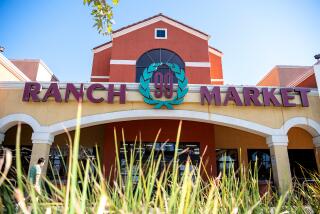Italy’s Mom-and-Pops Disappearing
- Share via
ROME — It was practically a daily ritual: Stroll to the baker to buy a loaf of crusty “pagnotta” hot from the oven. Then visit the fish vendor a few doors down to see what’s fresh. Maybe stop to chat with the woman at the vegetable stand on the corner.
But Italy’s mom-and-pop shops are rapidly becoming folklore. Supermarkets and superstores are winning away consumers with cheaper prices, longer hours and lots of parking space--a rarity for the little shops along the narrow streets of historic city centers.
About half of Italy’s typically family-run corner grocers and a third of its other small stores have shut their doors since 1991, according to Italy’s association of businesses, Confcommercio.
At the same time, the number of supermarkets has doubled and the ranks of the even larger ipermercati, or superstores, have grown 25%.
Italy’s changing family life is one big reason why.
Families with two working parents are becoming increasingly common, and they no longer have the time their parents did to devote to shopping.
While it may be relaxing to chat with local merchants at the mom-and-pops, it’s also frustrating to have to line up to order and then pay at several stops--the butcher, the baker, the light-bulb store and so on down the block.
So superstores located as close as a mile from city centers are especially attractive.
For instance, there is the recently opened Superal store in Rome, with its handy 150 underground parking spaces--a rare luxury in the traffic-jammed capital.
“Even if you spend three hours here, you can get everything you want in one time without having to go here and there and look for parking each time,” said Silvia Borsani, 31, a teacher. “Plus everything is so fresh, because there is such a high turnover. It is worth giving up the corner stores to come here.”
Saving money is also a high priority for Italians worried about the 12.4% jobless rate and bothered by a flurry of new and higher taxes designed to increase government revenues and help Italy qualify for the European Union’s common currency.
By selling in large quantities and reducing services, the big stores can keep prices an average of 10% below those of smaller stores.
Owners of small family businesses, who have seen 370,000 of their colleagues shut since 1991, are pressing the government to stop granting building licenses to large stores.
“We want rules that limit the big stores’ development,” said Marco Venturi, head of the small-business association Confesercenti. “There is no war, but we want some certainty. If a store knows that after 15 days, a department store will open next door, then it won’t invest and renew.”
The small stores also were hurt when Italians’ overall consumer spending fell every year from 1991 through 1996.
But consumer groups say the small-store owners have dug their own graves by failing to pick up on people’s changing needs.
“The small stores were left behind,” said Gianni Salvarani, head of ADOC, a consumer group. “They have done nothing to modernize their methods. They have closed unto themselves as if the supermarkets were an aggressor, instead of trying to improve.”
Some people worry that the life of Italy’s vibrant city centers will be weakened by the big stores, which can’t fit in the narrow confines of ancient cities and must open up on the outskirts.
“We are heading toward the death of the city’s neighborhood life,” said Luciano Solustri, 54, who runs a bakery and grocery with his wife and daughter on the edge of lively Piazza Vittorio--site of one of Rome’s largest open-air produce markets.
But Carlo Mochi, vice president of the Confcommercio business association, feels the rising number of elderly Italians--more than a third of the population now--will guarantee that mom-and-pop stores stick around.
“It is probable that the growth of large stores will continue,” Mochi said. “But it is also probable that the number of elderly will grow, giving work to corner stores, especially those that start offering delivery or other types of services.”
More to Read
Sign up for Essential California
The most important California stories and recommendations in your inbox every morning.
You may occasionally receive promotional content from the Los Angeles Times.












